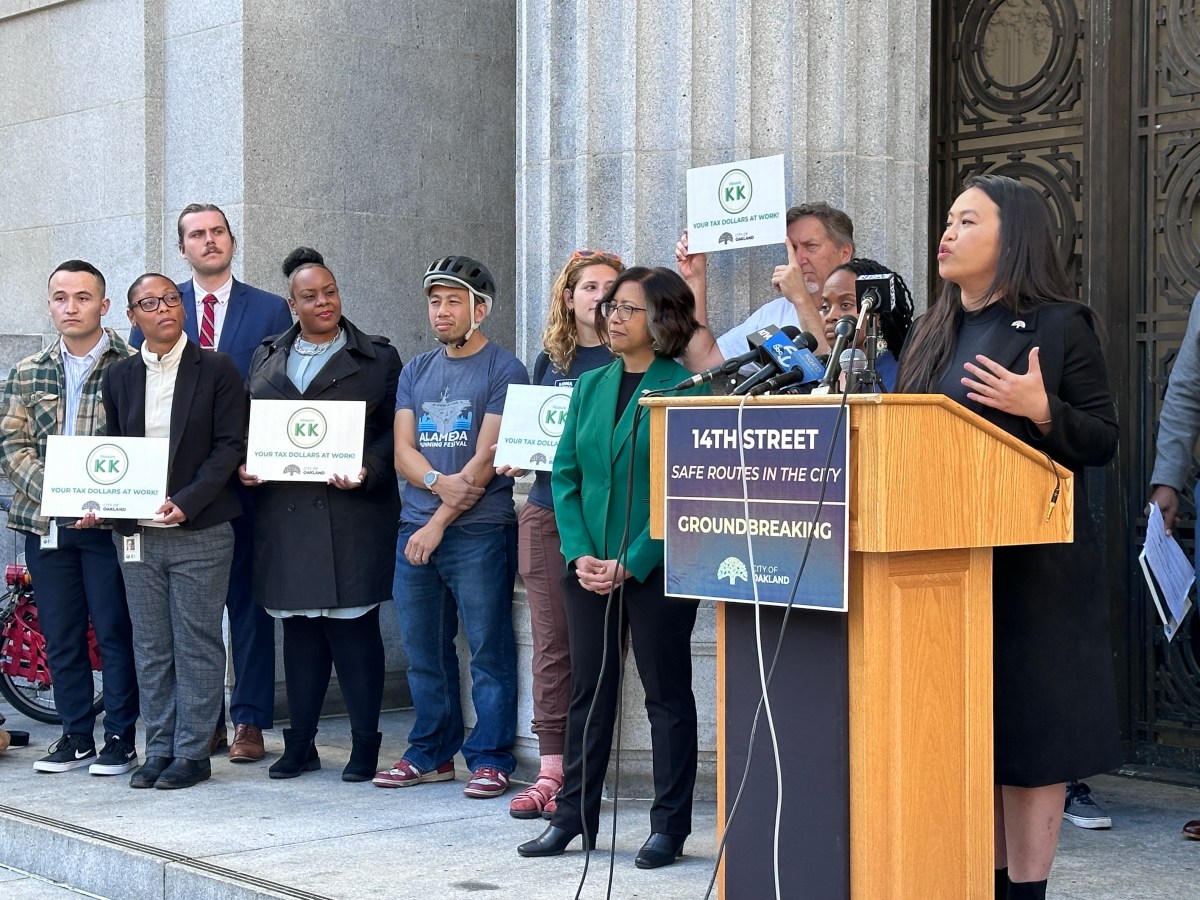Changes to one of downtown Oakland’s busiest roads will slow down traffic, but it will take two years to accomplish.
In around two years, people will be able to bike and walk from I-980 in West Oakland all the way to Lake Merritt much more safely.
At least that’s what Oakland officials promised Monday at a press conference on 14th Street outside City Hall, one of the city’s most dangerous roads.
“I support this project because I know Oaklanders are tired of feeling unsafe when they’re walking, biking, and driving across our city. [This project] is going to make a difference and save lives,” Mayor Sheng Thao told a small crowd of staffers and advocates gathered Monday.
Thao added that bringing more people like cyclists and pedestrians into public spaces like 14th Street will add “more eyes on the street” and possibly deter crime.
14th Street will receive a “road diet,” which takes away a vehicle lane to slow down cars, new bike lanes protected by concrete barriers, concrete islands known as bulb-outs that will make it harder for vehicles to turn quickly into roads, and shorter crosswalks.
This rebuild should reduce traffic collisions that lead to severe injuries or deaths. It’s one of several street redesigns taking place in Oakland right now.
City Department of Transportation engineers told The Oaklandside Monday the permitting process has already begun and they plan to start ripping up the existing road within weeks.
The redesign will completely transform 14th Street from Oak Street near Lake Merritt to Brush Street, just past I-980.
The press conference was attended by Councilmembers Carroll Fife, Nikki Fortunato Bas, Janani Ramachandran, and Oakland Department of Transportation Director Fred Kelley.
Councilmember Fife said the first time she met with one of the street safety advocates leading the cause to improve roads was 18 months ago at a protest and vigil for a deaf resident, Dmitry Putalov, who was killed in front of his two children while they were riding bikes on 14th Street.
“So many of the streets of Oakland are not streets. They’re actually speedways, and we are taking the appropriate steps today to start the change,” Fife said. “It is the transference of our high injury network into something that is livable and lovable by all of the residents in Oakland.”
Councilmember Bas said these projects are important because people either die or get seriously hurt on Oakland roads in Oakland, on average, twice a week. And seniors are more vulnerable.
“Our elders, our children, and families living in our neighborhoods, through OakDOT’s analysis, through the Oakland Safe Oakland Streets Initiative, has found older Oaklanders 65 and older are more than two times as likely to be in a crash compared to all other Oaklanders,” she said.
“It really excites me that our Department of Transportation has decided to use evidence-based tools to curb driver behavior because our cars are undeniably speeding,” Councilmember Ramachandran noted.
According to the Transportation Injury Mapping System, a database run by the Safe Transportation Research and Education Center project at UC Berkeley, 10 people have been either killed or seriously injured on 14th Street between Oak Street and Brush Street, in the last ten years in Oakland.
Local traffic safety advocates we spoke to said they are pleased the project is finally happening.
Tim Courtney said the redesign will improve the connection between West Oakland and downtown.
“I’m glad they’ve included concrete-protected bike lanes, which physically keep people on bikes safer from the cars. That will encourage more children and seniors to bike, “ he said.

